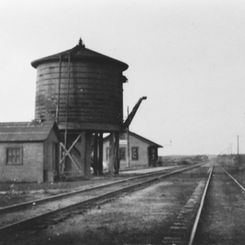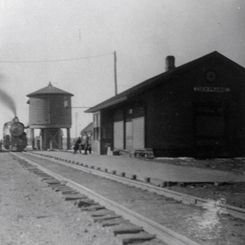

MILLER STORE

The Miller’s General Store was the cornerstone of Eden Prairie’s original “downtown” for many years.
With the arrival of the Minneapolis/St. Louis Railroad to the area in 1871, Fred Miller bought the perfect spot to build his store. It was located at what today is the intersection of Eden Prairie Road, and (with the old train tracks now removed) the Southwest Regional LRT Trail, near the entrance to Miller Park. Also at this location were a train depot, a creamery, grain elevator, school, and several houses and farmsteads.

At Miller’s store, early Eden Prairie families could get most anything they needed, including groceries, clothing, medicine, even T-bone steaks for 25 cents a pound! They sold kerosene, which of course was used for lamps. And when the gas engine came into use, Fred put in a 200-gallon tank (Eden Prairie’s first), and sold it by the gallon. The first telephone in Eden Prairie was also installed at the store, by the Northwest Telephone Co. of Minneapolis. It was a free phone that the Millers didn’t get charged for, and everyone in town could use.
For 47 years, Fred Miller also served as postmaster, and then eventually his son Fred Jr. took over. Harry Neill was the mail deliveryman for 36 years. Harry, being an accommodating man, carried groceries from Miller’s Store to people along the route, until the post office department found out about it, and told him it was against the law.

The store itself looked like a two-story building out of an old western movie, the kind with a balcony running across the entire front of the second floor. This second floor served as the village hall for more than 50 years. All types of gatherings took place here: elections, milk meetings, weddings, medicine shows, and dances – many dances, that would often go until 2 or 3 o’clock in the morning! And Kate Miller herself would cook a warm lunch for the annual town board meeting, or make her famous oysters for the annual Woodman of America oyster dinner, also held in the hall.
For the Millers, there was never a dull moment.
Their house was located right next to the store. Fred and Katherine (Kate) had four boys, Fred Jr., Arthur, Harold, and Norman. They all helped with the store, and also soon owned the grain elevator, and an implement business. Being located so close to the train depot, “hoboes” or “tramps” were often coming to the door for handouts. Fred would send them out to the woodpile to split wood for a while, then Kate would give them a good meal.
One day, their son Arthur went out to feed the horses, and found a very sick man sleeping in the hay. They set him up a cot in the hall above the store, and called Dr. Smith from Shakopee. Kate cared for the man for more than two weeks. One day, he came down, thanked Kate, and went on his way.
Nomadic Gypsies would also “float” threw the area during the summer months. They first came in groups of three or four wagons, and then in later years, by car. The men were said to be very handsome, with their dark hair, brown eyes, and red bandanas around their necks. The women wore very colorful clothes with big aprons and many skirts. They often camped by Miller’s Spring on Spring Road.
The Miller’s were involved with the people in their community.
Dotty D. Nye, who taught in Eden Prairie schools for 25 years, and boarded with the Miller family, tells of the traveling salesmen who would often be invited to stay for dinner, and of a man named Monroe Barker.
Monroe, better known as “Mun,” was an ex-slave from the south, and as a boy, with no parents or family, made his way north after the Civil War. Eventually, he came to Eden Prairie, and the home of Fred and Kate Miller. By this time, he was a grown man. He was known for his gift of tending to horses. The Miller family always saw to it that he had work around town, and got paid the going rate.
One day, Mun became very ill. Kate took care of him as if he were one of the family, but he soon died. It was March 1942. The funeral was held in the Miller family home, and was very well attended. Before he died, he bought a granite tombstone with just his name on it, because he didn’t know when he was born, but guessed to be at least 90.
He also bought a cemetery plot at the Eden Prairie Cemetery on County Road 4. Monroe Barker left all his possessions, including a few hundred dollars, to Kate Miller, the lovely lady who had been his friend.
Kim Carlander 2007.




